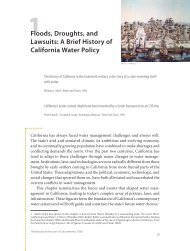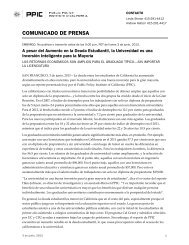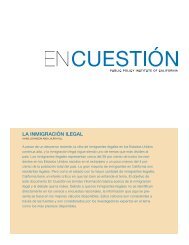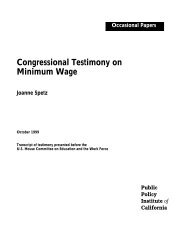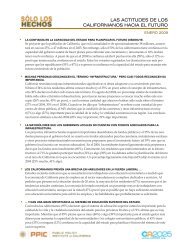Occasional Paper Title - Public Policy Institute of California
Occasional Paper Title - Public Policy Institute of California
Occasional Paper Title - Public Policy Institute of California
Create successful ePaper yourself
Turn your PDF publications into a flip-book with our unique Google optimized e-Paper software.
Summary<br />
The demise <strong>of</strong> the <strong>California</strong> Technology, Trade, and Commerce Agency gives <strong>California</strong><br />
the opportunity to rethink its provision <strong>of</strong> international business services. Previously,<br />
<strong>California</strong> provided such services by helping firms export, attracting investment from overseas,<br />
guaranteeing export finance, and sponsoring overseas trade and investment <strong>of</strong>fices. The case is<br />
by no means certain that the state should be involved in providing such services. However,<br />
should the state decide to reenter the field, it will be helpful to recognize that in the current<br />
international business environment, a large share <strong>of</strong> international business activity occurs<br />
through networks, suggesting that it is advantageous for a business to be linked to these<br />
networks. Furthermore, businesses involved in one form <strong>of</strong> global engagement, for example,<br />
exports, are <strong>of</strong>ten involved in other forms.<br />
A justification for state involvement is that businesses, workers, and communities<br />
engaged with the global economy generally are more prosperous that those that are not. This<br />
does not mean global engagement brings unmitigated benefits, only that there is a tendency for<br />
the benefits to outweigh the costs. Should the state reconsider its approach to international<br />
business services, any program design should be built around the needs <strong>of</strong> clients – small and<br />
medium-sized enterprises as well as interested foreign investors – and around the wealth <strong>of</strong><br />
international business services already <strong>of</strong>fered in the state. Greater involvement <strong>of</strong> the private<br />
sector may be beneficial, and there are several models from which to choose. Foreign <strong>of</strong>fices<br />
may be a useful adjunct but must be linked to strong domestic support.<br />
Setting standards and evaluating performance will remain difficult, as they are for many<br />
state international programs around the United States. However, the state should avoid an<br />
oversight and evaluation system in which its <strong>of</strong>ficials are expected to take full credit for an<br />
export sale or some other international activity. Such activities are seldom the result <strong>of</strong> action<br />
by only one person or agency. Client surveys and external audits can be helpful for providing<br />
feedback and building credibility.<br />
Given limited budget resources, the state can treat the next half year as a planning<br />
period, reestablish a high-level <strong>of</strong>fice for international business, conduct an inventory <strong>of</strong> the<br />
services and gaps in services available to businesses statewide, and examine more rigorously<br />
which services the state’s small and medium enterprises would value.<br />
- iii -




